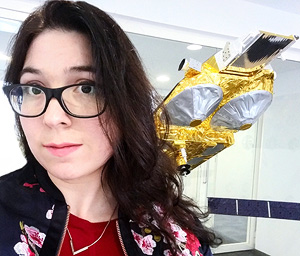DA alumna Anna Maria Trofaier on her career since graduating from ETIA 02 in 2010
DA: Where are you currently working and what are your responsibilities within the job?
 Anna Maria Trofaier: Having been a research fellow with the European Space Agency a couple of years ago, I recently returned to work for their Climate Office. I’m a cryosphere scientist, that is I am interested in monitoring the dynamics and the changes in distribution of ice and snow on Earth from space. My role within the Climate Office is to manage several projects within our Climate Change Initiative (CCI) programme.
Anna Maria Trofaier: Having been a research fellow with the European Space Agency a couple of years ago, I recently returned to work for their Climate Office. I’m a cryosphere scientist, that is I am interested in monitoring the dynamics and the changes in distribution of ice and snow on Earth from space. My role within the Climate Office is to manage several projects within our Climate Change Initiative (CCI) programme.
To monitor the climate, we need to work on decadal time scales. To be precise, we need at least thirty years of data. We have now reached the golden satellite era for climate research. We have had Earth Observation satellites in space since the late 70s. But each sensor is different. In order to take advantage of the entire satellite data archive we need to reprocess and intercalibrate the data to arrive at a standardised data set that can be fed into climate models. This has to be done for each climate variable, the so-called essential climate variables (ECVs), separately. The CCI is comprised of several projects that are each dedicated to an ECV. My role is to manage several of these projects (those that are related to the icy parts of the world – sea ice, glaciers, snow, and soil moisture from a hydrological perspective, which also includes freeze/thaw cycles). My responsibilities are to ensure that the R&D is technically sound and feasible, and that all projects deliver on time and communicate their science to the wider public. Ultimately, what we do feeds into the IPCC report, and is in support of the UNFCCC.
Were your interests always related to the European Space Agency?
I have always been interested in space, and in fact my first degree was in Astrophysics. It was only after I graduated that I decided to change my perspective and focus on monitoring our own heavenly body. The reason why I chose to follow the ETIA programme was that after studying the driving forces of the universe, I felt it was timely to gain a better understanding of how our own world and its society worked. I suppose, at this stage I had not yet decided what career path to take but I knew I needed to widen my rather narrowly focused expertise. It was only during the second year of the ETIA programme that I realised how to apply my skillset, and side-stepped into satellite remote sensing for environmental monitoring. It was easy to swap from looking out into space to looking down to Earth. I joined a team at the TU Wien who was working on an ESA funded project to monitor permafrost from space. It was then that I managed to get my foot in the door of the space industry.
What was your thesis for the ETIA programme on?
My thesis for the ETIA programme was on monitoring thaw lakes in permafrost regions, and the need for international cooperation to ensure the establishment of operational monitoring frameworks. I continued to do a PhD at Cambridge, funded by the Austrian Academy of Sciences, on developing new space-borne radar techniques to monitor Arctic surface hydrology in permafrost regions. Throughout my research career I kept my links to the TU Wien.
Were you able to apply any of the knowledge and skills acquired during your ETIA studies to your current job?
I feel particularly fortunate to have arrived at my current job. Don’t get me wrong, it was hard work, perseverance and determination that paved the way. But once I understood my abilities and learnt how to make use of them, I was strategic in choosing the direction I needed to take to arrive at my current post. ETIA helped me determine my strengths and how to combine them with my passions. The Diplomatic Academy in particular challenged me to assess how science is translated into policy, and how to get to grips with the human dimension of understanding our Earth system.
I may be new in my current job, but from the start of my relationship with ESA I have always felt at home within the agency, not least because I was initiated into the mechanisms of how international organisations work during my time at the DA. Climate science demands international cooperation. Sometimes the best scientists are those that engage with the international community to ensure research does not remain in a vacuum but leads to actions.
Have you been making use of the alumni network?
Admittedly not enough. I must remedy this.
[From ClubDA News 1/2018]